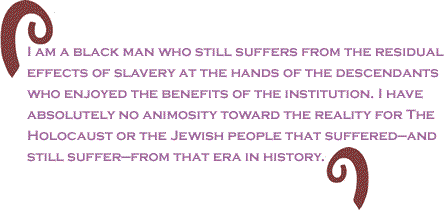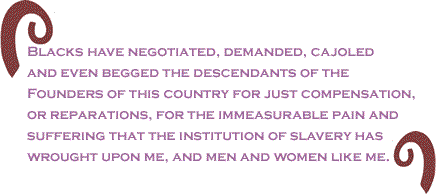| This
commentary will do one of two things: it will either open
robust and earnest dialogue on matters of great import to
Americans or it will draw the ire of self-important people
who discount the experiences of others.� Of course, I hope
for the former, but expect the latter.
I�m pretty much sick of the concerted attempts to equate the institution of
American Slavery with the Holocaust.� When this happens,
it does three things: it cheapens the longevity and impact
of the American Slavery experience; It distorts the perspective
of the American systemic power structure (which lasts to
this day), and it mis-educates children who know no better.
I am a black man who still suffers from the residual effects of slavery at the
hands of the descendants who enjoyed the benefits of the
institution.� I have absolutely no animosity toward the
reality for The Holocaust or the Jewish people that suffered�and
still suffer�from that era in history.� Blacks have negotiated,
demanded, cajoled and even begged the descendants of the
Founders of this country for just compensation, or reparations,
for the immeasurable pain and suffering that the institution
of slavery has wrought upon me, and men and women like me.�
I find it highly offensive that Jews have been awarded due
reparations, when Blacks�from the land that committed the
atrocity of slavery�can�t even gain an audience.�

The Reparations Agreement between
Israel and West Germany (German: Luxemburger Abkommen, Hebrew: Heskem HaShelomim) was signed
on September 10, 1952, and entered in force on March 27,
1953.� According to the Agreement, West Germany was to pay Israel for the slave labor and persecution of Jews during
the Holocaust, and to compensate for Jewish
property that was stolen by the Nazis.
What we know is that public debate was among the fiercest
in Israeli history. Opposition to the agreement came from
both the right (Herut and
the General Zionists) and the left (Mapam)
of the political spectrum; both sides argued that accepting
reparation payments was the equivalent of forgiving the
Nazis for their crimes.
That was 1953.� Good for the Jews.�
What I know is that Rep. John Conyers (D-MI) first introduced
bill H.R. 40 in 1989, and has in every congress since, with
no results.� I am not surprised�and neither should you.�
The disregard for the Black experience is perpetuated from
the top echelon of power in America throughout the American
civilian psyche.� Whether politics or academia, sports or
media, the Black experience has been under attack; co-opted
and de-sensitized by the most visible Americans, thus giving
the aire of legitimacy to down-playing the severity of �the
peculiar institution.�
I am a staunch opponent to any type
of historical insults that are either racial, gender-based,
national in origin, ethnic or disability-fostered.� Americans
should be civil and held to a higher standard than that
of other nations�especially the Western ones who embrace
racism�in order to eradicate the desensitization of racism.�
I have found that Jews, in an attempt to be self-deprecating,
insult themselves, which insulates them from being accused
of being �overly-sensitive��then they proceed to insult
others.� If you choose to inflict injury upon yourself,
then that�s your choice, but it�s MY choice to NOT
accept being insulted by you or anyone else.� That is no
other person�s determination.

We�ve seen this tactic from radio
therapist, Laura Ingram, or from conservative radio talk
host, Rush Limbaugh, or from comedienne Joan Rivers.� Once
the degradation takes place, Blacks get accused of being
too sensitive.� You�ve GOT to be kiddin� me???� Because
I choose not to be insulted is no reason to diminish my
position.
What�s even worse is the conscious
campaign to equate Slavery to The Holocaust.� Let me give
you four reasons why this is erroneous at best, an insult
at worst.
1.
the numbers don�t add up-the genocide of approximately six million European
Jews during World War II by Nazi Germany (it�s very well more) pales in
comparison to the uncountable numbers of Blacks killed
via the Middle Passage and other undocumented slave trading
routes
2.
the period of suffering is non-comparative-let Jews tell it, they�ve
been persecuted for centuries�I believe that, though it�s
irrelative to the Holocaust comparison.� I also know that
Blacks have been under attack for at least 12 years� and
that should always come in the same breath
3.
The Jews have made leadway-The Holocaust has had movement toward
repairing the damage, where the sole acts to rectifying
slavery was legislation in America�that was later repealed,
not honored and is currently under attack
4.
The hue of the skin always makes an unequal argument in America-as we look at the �on-the-ground�
reality of Jews and the Israeli state awarded to them
by Western powers, the faces are white.� In this country,
the very Jews who get to offend others with impunity are
white.� You can call them �minority immigrants�, but you
and I both know that they�re white�which, in America,
amounts to privilege.
5.
Jews weren�t harvested as labor-Blacks were arguably despised as
Jews were, but blacks were kept as free labor; aside from
the anti-Semetic slurs from time-to-time, Jews have been
�let back� into society on equal terms
Unfortunately, Jews lead us to think that the Holocaust was
a worse atrocity, positing that �the main purpose of the
Holocaust was genocide.�� That is to say that slavery wasn�t.�
How erroneous�Genocide is the deliberate and systematic
destruction, in whole or in part, of an ethnic, racial,
religious, or national group.� If both argue that, then
let the comparison begin�

Inversely, I could sit and make all kinds of similarities between the
two groups.� They would not equalize these scales.� I said
all of that to say this: The Holocaust should not
be compared with Slavery�never.� Don�t do it.� They
are two separate events with two separate objectives, to
two separate people, with two separate�and disparate--outcomes.�
Sure, both groups were robbed, but that doesn�t make the
theft equal.

BlackCommentator.com Columnist Perry Redd is the former Executive
Director of the workers rights advocacy, Sincere Seven,
and author of the on-line commentary, �The Other Side of the
Tracks�. He is host of the internet-based talk radio
show, Socially Speaking in Washington, DC. Click here to contact Mr. Redd.
|

